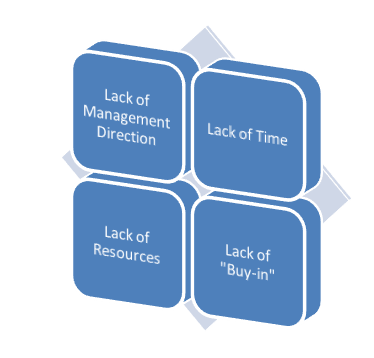Sage 100 ERP Partner Reviews Why Improvement Projects Fail Part 2
As a Sage 100 ERP Partner, we work with our clients to help with the selection, implementation, customization, training and ongoing support of ERP...
3 min read
Richard Cushing Wed, Sep 17, 2014

 As a Sage 100 ERP Partner, we’ve helped our clients over the years accomplish the challenging task of the successful implementation of ERP software and other businesses tools to help their business grow. So many companies set out with grand designs intended to bring about breakthrough improvements—sometimes goals are just internal, and sometimes the hope is for change across their supply chains. We wanted to share what we learned about why improvement projects fail and how to avoid them in part 1 and part 2 of this blog series.
As a Sage 100 ERP Partner, we’ve helped our clients over the years accomplish the challenging task of the successful implementation of ERP software and other businesses tools to help their business grow. So many companies set out with grand designs intended to bring about breakthrough improvements—sometimes goals are just internal, and sometimes the hope is for change across their supply chains. We wanted to share what we learned about why improvement projects fail and how to avoid them in part 1 and part 2 of this blog series.
There are four major reasons that such transformations fail:
My guess is that if you are involved in managing any aspect of a small to mid-sized business enterprise, you have experience more than one such failure. My further guess is that, if you have experienced one, you have experienced several failures of varying size and complexity.
Let's take a closer look at what's missing.
It is not our intention here to cast a bad light on management. In many cases they are doing their very best to come up with good—even, the best—ideas for improvement. They pay attention to planning. They lay the groundwork for execution. In fact, it is often not even the planning or the execution that fails! What fails is that the project—once complete—does not produce the intended results when improvements are measured (or, at least, observed). Over the years, many things have been tried, I would imagine.
Some efforts produced pretty good results—but probably fewer than one-in-three of the attempts made. Other efforts seemed to produce no positive results at all. Of course, lack of positive results didn't keep the "cost" side of the equation from being fulfilled "according to plan." The costs of improvement projects—the expenditures of time, energy, money, and management attention—always come to fruition. It's the benefits—the ROI (return on investment)—management was hoping for that seldom are achieved.
And, sadly, in some cases—perhaps, one in five or one in ten—the outcome of all the efforts was negative. Things just did not work as management had hoped. The whole idea had to be scrapped and newly instituted policies, procedures and more had to be unwound back to the starting point.
The problem—even for MBA-holders—is that the tools commonly applied by management cannot answer the three basic questions the answers to which management must surely know to provide reliable direction to their organization.
The three questions are…
One can be certain that your firm's ERP system cannot answer these questions. The data in your ERP system, or big data, might provide some clues along the way, but it has no answers for management regarding these fundamental questions.
There is, however, a reliable set of tools that have proven to be effective in organizations of every size and across a huge array of industries—from mom-and-pop operated doughnut shops to divisions of Fortune 500 firms; from the military to aerospace to education and, even, in the healthcare industry. The toolset to which we refer is called simply, the "Thinking Processes" and it originated with Eliyahu Goldratt.
This simple set of tools can be leveraged to give management sound answers to the three fundamental questions. This, in turn, gives management what it needs to set a proper and reliable course toward improvement for the whole organization—or, even, the broader supply chain.
Interestingly, when we work with clients using the "Thinking Process," we never ask people to try something new that we brought in from the outside. We don't tell people how to improve their company or their supply chains, or how to make more money.
What we do is help them unlock what they already know—we call it "tribal knowledge"—and see what they already know in a fresh new light that helps them discover their own simple, reliable path toward a process of ongoing improvement.
This method automatically gets "buy-in" at the same time: nobody sabotages or fights against their own ideas and methods. If they created them, they will work hard to make them effective.
You, too, can stop dealing with their four significant transformation causes failure. You can learn to use the "Thinking Process" tools from Eliyahu Goldratt. There's plenty of information on their use and application on the Internet.
Get started today! We will review the other 3 major reasons that business transformation fail in part 2 of this blog series; lack of time, lack of resources, and lack of buy-in.
If you have questions about this blog or want to learn more about your ERP options CONTACT US, visit our WEBSITE, call 717-735-9109 or EMAIL sales@rklesolutions.com. One of our expert ERP business technology experts will be happy to help.
RKL eSolutions, LLC offers customized IT services to businesses in a wide variety of industries. As an authorized Sage provider, they implement and support Sage ERP X3, Sage 100 ERP, and Sage 500 ERP solutions. As a Microsoft Certified Gold partner, they also provide sales, installation and mentoring on products like Windows, Hyper‐V, Exchange, Active Directory, SQL Server, SharePoint, Terminal Services, Cisco, and VMware. With offices in Pennsylvania, Massachusetts, Virginia, Arizona, Florida, Ohio, and California, RKL eSolutions provides Sage ERP implementation, training, and support to companies throughout the U.S.
Visit www.rklesolutions.com to learn more.

As a Sage 100 ERP Partner, we work with our clients to help with the selection, implementation, customization, training and ongoing support of ERP...

As a certified and experienced Sage 100 ERP consultant, I wanted to share an experience we had with a client who had a technical issue with...

Sage 100 Consultant Tip: What to do when Paperless Office won't print Sage 100 ERP consultant, we had a client who had a technical issue with...